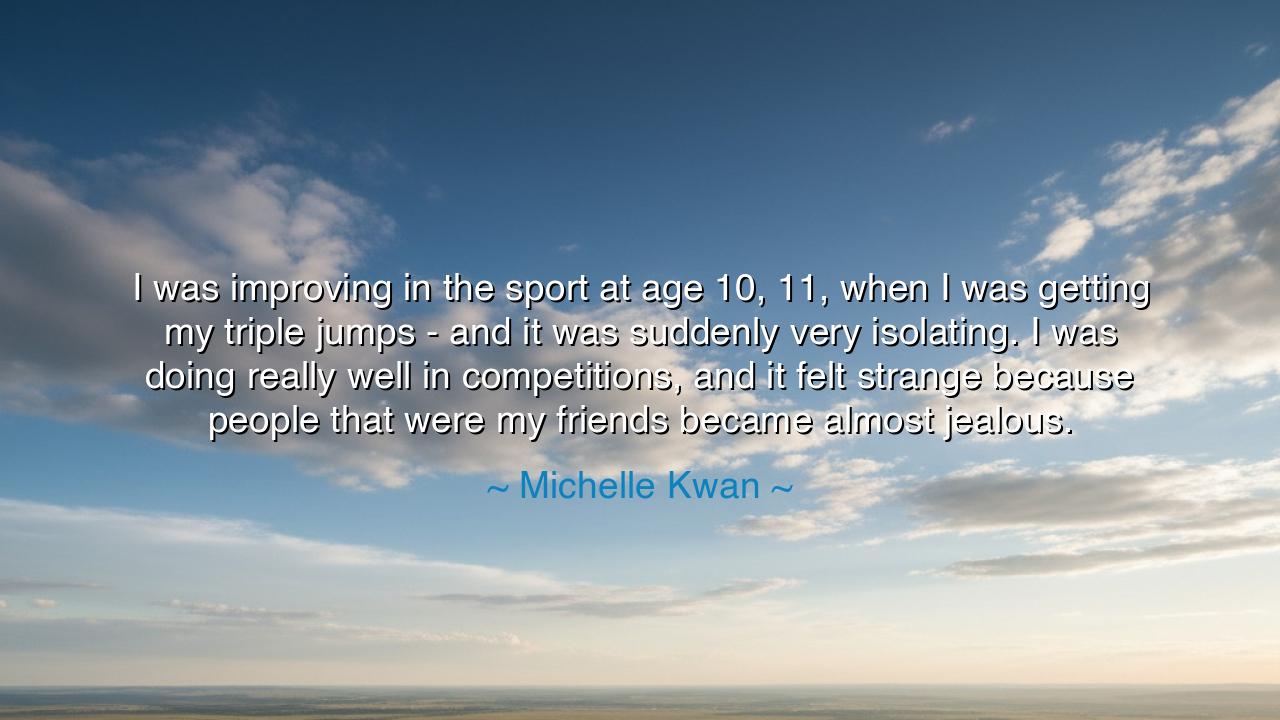
I was improving in the sport at age 10, 11, when I was getting my
I was improving in the sport at age 10, 11, when I was getting my triple jumps - and it was suddenly very isolating. I was doing really well in competitions, and it felt strange because people that were my friends became almost jealous.






"I was improving in the sport at age 10, 11, when I was getting my triple jumps - and it was suddenly very isolating. I was doing really well in competitions, and it felt strange because people that were my friends became almost jealous." – Michelle Kwan
In the pursuit of excellence, there often comes a moment when the very achievements that once brought camaraderie and joy begin to create distance and isolation. Michelle Kwan, in her reflection, speaks to the loneliness that can arise when one’s success in a chosen field—whether it be in sport, art, or intellect—sets them apart from others. At a tender age of 10 or 11, as she found herself excelling in triple jumps, the success she garnered in competitions began to transform the relationships she held dear. What was once mutual support turned into envy and jealousy, leaving her feeling isolated despite her achievements. This is a universal experience: that success, though a reward in itself, often comes with sacrifices and challenges that are unseen by the world.
The ancient Greeks, with their love of competition and their belief in virtue through achievement, understood the tension between success and isolation. Consider the story of Achilles in the Iliad, who, despite his unmatched prowess in battle, found himself alienated from his fellow Greeks when he refused to fight because of an insult to his honor. His success on the battlefield only furthered the divide between him and his comrades, demonstrating how even the greatest of victories can lead to a disconnect from those around us. This tension between the pursuit of excellence and the alienation it can sometimes cause is as old as the stories of heroes and warriors, who often found themselves alone despite their great accomplishments.
In the same way, Michelle Kwan’s experience of isolation as she excelled in her sport resonates deeply with the universal struggle of balancing individual success with shared connection. There is a certain bitterness that can arise when one rises above the others, and it is this jealousy—a natural, though often destructive, human emotion—that Kwan speaks of. The fame that accompanies success, while it can bring admiration from afar, also carries the weight of alienation from those who might once have been our closest friends. This is a difficult truth to accept: that the pursuit of greatness may require us to make sacrifices that are not always immediately apparent.
Consider the philosopher Socrates, whose wisdom and intellectual achievements earned him both admiration and disdain. Though he was celebrated for his profound insights into the nature of truth and justice, he also faced the resentment of those around him who could not grasp the depth of his thoughts. Socrates’ experiences reveal that even the greatest minds are subject to jealousy and alienation, especially when their success causes them to stand apart from others. Like Kwan, Socrates found that his pursuit of excellence in his field created a divide between him and his fellow citizens, who were often suspicious of his superiority and his refusal to conform to conventional ideas.
This tension is not merely an academic or philosophical matter, but a deeply emotional and human experience. The feelings of isolation that arise from success are a form of sacrifice—one that is often unacknowledged. For Kwan, the very achievement that should have brought pride and joy also brought a loneliness that she had not expected. The lesson here is that the pursuit of success—while noble and worthy of celebration—can sometimes require us to leave behind relationships that were once close and dear. This is the cost of greatness, the price one pays for standing apart from the crowd and achieving something extraordinary.
Yet, the wisdom of the ancients also teaches us that true fulfillment lies not just in individual achievements, but in the ability to maintain relationships and community while pursuing excellence. The Stoics, particularly Marcus Aurelius, believed that a person should not only seek personal growth but should also strive to harmonize their achievements with the well-being of others. Marcus wrote that “what is not good for the swarm is not good for the bee,” emphasizing the interconnectedness of all beings. In Kwan’s case, her journey reminds us that success should not sever our ties to others but should be shared in a way that uplifts those around us, ensuring that community is preserved even as we strive for greatness.
The lesson we must take from Michelle Kwan’s experience is this: success is not merely a matter of personal achievement, but a balance between individual growth and the maintenance of meaningful relationships. It is crucial that we recognize the emotional costs of success and take active steps to nurture the bonds that sustain us, even as we rise to greater heights. In practical terms, this means reaching out to those who may feel left behind, sharing our victories with those who support us, and ensuring that our success does not isolate us from the communities that give us strength. True greatness lies not only in the individual’s achievements but in their ability to remain connected to the humanity of others. Let us strive for a success that lifts us all, rather than one that distances us from those who were once by our side.






AAdministratorAdministrator
Welcome, honored guests. Please leave a comment, we will respond soon